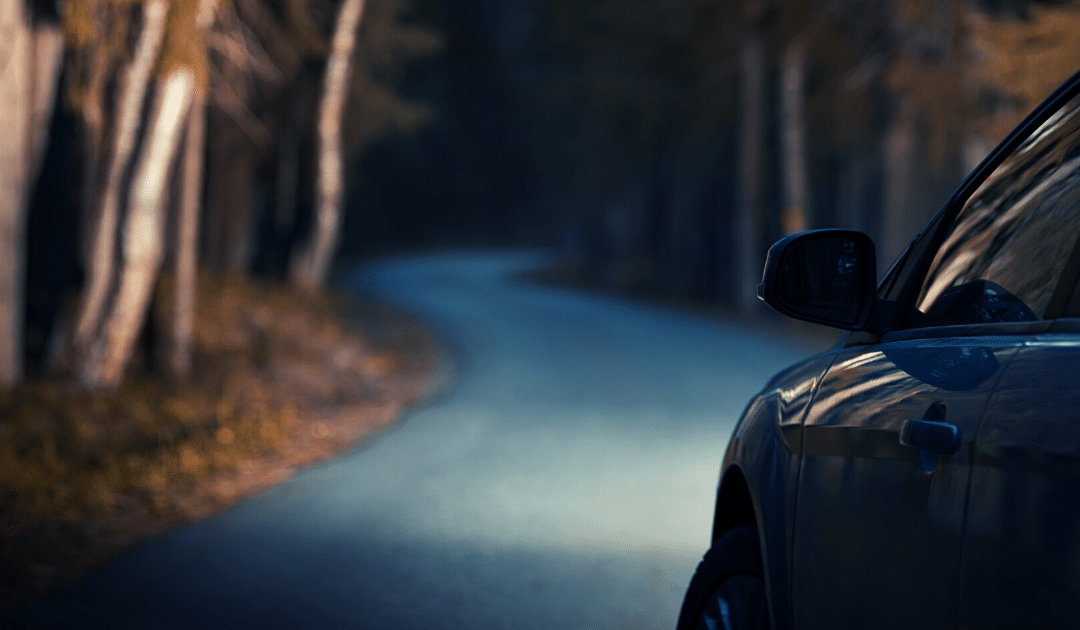When daylight savings ends and our days become shorter, motorists will find themselves driving more often at dusk and in the dark.
As we turn our clocks back, it’s important to keep in mind that night driving is more dangerous than daytime driving – mostly due to reduced visibility and difficulty judging speed and distance. In fact, according to the National Safety Council, while we do only one-quarter of our driving at night, it’s when 50 percent of traffic fatalities occur.
Here are five ways you can stay safer on the roads at night.
1. Be Headlight Savvy
Proper headlight usage and maintenance will go a long way toward safe night driving. Remember the general rule of turning headlines on before sunset, and keeping them on for an hour after sunrise, which will help other drivers see you. Also:
-
- Aim headlights correctly (ask your dealer or mechanic/repair shop to double-check them next time you’re in).
- Make sure they’re clean.
- Regularly test your high beams, low beams, running lights, turn signals, and brake lights.
- On rural roads or other dark areas, use high beams. Dim them when you’re within 500 feet of an oncoming vehicle.
2. Slow Down and Give Room
Due to reduced visibility, drivers at night often need more time to both see other cars, pedestrians, and obstacles, and also to react safely. Give yourself the advantage by slowing down a bit and also giving yourself some extra room on the road.
-
- Increase your following distance from other vehicles.
- Allow more time for your journey.
- Be a(n extra) defensive driver, as others may be intoxicated or driving erratically.
- Watch out for pedestrians and wildlife. For the latter – collisions with deer are most common at dusk or at night, usually October through January (see our 30-second video on what to do if you hit a deer).
3. Give Your Car’s Interior a Once-Over
A little extra attention inside your vehicle can greatly affect how you see and react to things outside your car.
-
- Clean the windshield – inside and out – removing all streaks, smudges, and fogginess.
- Clean the other windows as well to reduce glare and condensation.
- Use your car’s defroster or heater to prevent your windshield from fogging up.
- Dim your dashboard lights so controls are still visible but not distracting.
- Use visors to shield the glare of outdoor street lighting.
- Avoid using cabin lights as much as possible when driving at night.
4. Stay Alert
Two big risks on nighttime roads are drunk driving and drowsy driving. Always remember and stay alert for other drivers who may be impaired due to alcohol, fatigue, or distraction. For yourself, never drive intoxicated and use the tips below to keep yourself alert.
-
- Take breaks if you need to – get out and do jumping jacks, shake out your limbs, stretch, take some deep breaths.
- If you’re on a long trip, try these things to stay awake: coffee or caffeinated drinks, windows rolled down for fresh air, talking, or singing to yourself.
5. Be Kind to Your Eyes
You can take steps, both in the moment while night driving, and in the longer term to take care of your eyes so they can take care of you on the road.
-
- Make sure you get your eyes checked regularly, which will alert you to any vision changes. If you wear prescription lenses, you may need a different prescription at night.
- Make sure your glasses are anti-reflective.
- Never wear dark or tinted lenses for night driving.
- To protect your eyes from drying out, aim your car’s vents away from your eyes.
- Keep your eyes moist by blinking regularly, especially if you wear contact lenses.
- Don’t look directly at oncoming headlights; instead, look at the road marker to your right until the car passes.
Finally, avoid two-lane highways at night if possible, as they’re especially dangerous. This and the other tips above will help you stay stress-free and safer during nighttime driving.
This article is furnished by California Casualty. We specialize in providing auto and home insurance to educators, law enforcement officers, firefighters, and nurses. Get a quote at 1.866.704.8614 or www.calcas.com.
- Graduation – When to Remove Your Child from Your Auto Policy - May 18, 2023
- How to Prevent Catalytic Converter Theft - May 17, 2023
- How Much Does Home Insurance Cost? - May 17, 2023

